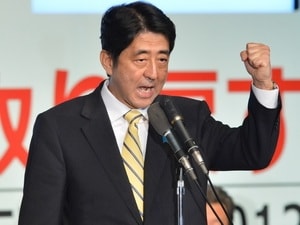Japan Election: The Election That Signals a Change of Power
Japanese voters will go to the polls in a snap election for the House of Representatives on December 16. This is a general election with a record number of political parties participating in the Land of the Rising Sun and is especially attracting the attention of voters because the people of the "cherry blossom country" hope that the election can bring changes for the better for them.
The election is likely to mark the return to power of the opposition Liberal Democratic Party (LDP) after more than three years of government by the Democratic Party of Japan (DPJ).

LDP President Shinzo Abe. (Source: AFP/VNA)
1,504 candidates from 12 political parties and independent candidates have registered to run for 480 seats in the House of Representatives. In the context of the Japanese economy continuing to show signs of recession due to the impact of the European debt crisis and the rising yen, Japanese voters are very interested in the economic and financial policies of the parties because those policies will directly affect their lives.
According to a poll conducted by the "Nihon Keizai" newspaper, Japanese public opinion currently highly appreciates the LDP's economic policy, which focuses on getting the country out of deflation, dealing with the rising yen, and restoring the economy after the earthquake-tsunami disaster and the Fukushima nuclear accident. However, the social insurance and financial reconstruction policies put forward by the ruling DPJ also receive widespread support from voters.
After the disaster at the Fukushima No. 1 Nuclear Power Plant, energy policy has attracted special attention from Japanese public opinion. Under strong pressure from the domestic anti-nuclear power movement, Prime Minister Yoshihiko Noda and the DPJ decided to include in their election platform a roadmap to completely eliminate nuclear power by 2030 and encourage the development and use of alternative energy sources.
However, this policy has met with opposition from businesses because they are concerned that high electricity costs and unstable supply will affect their production and competitiveness. Moreover, to research and produce electricity from renewable energy sources requires time and huge costs.
Meanwhile, LDP President Shinzo Abe said that the goal of “zero nuclear power” is ideal, but the LDP will prioritize ensuring a stable power supply and pledged to draft the “best policy mix on power supply structure” within the next 10 years. This LDP plan has won the support of Japanese businesses.
Foreign policy and national security are also emphasized by political parties in their election platforms in the context of North Korea's successful satellite launch and China's increased activities in the waters near the disputed Senkaku/Diaoyu Islands.
Except for the Japanese Communist Party and the Social Democratic Party, which oppose the alliance with the United States, including plans to redeploy US troops in Japan, most other parties emphasize the importance of this relationship in ensuring security for Japan and the region.
While the DPJ advocates peaceful and stable management of the Senkaku Islands, the LDP advocates placing permanent civil servants on the islands for effective management. The LDP also wants to upgrade the defense force into a regular army. This plan of the LDP is said to be aimed at winning votes from nationalist voters, although in reality, they are unlikely to be able to implement such a policy due to the relationship with China.
A notable point in the upcoming Lower House election is the trend of new small parties joining together to become a "third force" in Japanese politics. The "Japan Restoration Society" party founded by Osaka Mayor Toru Hashimoto has just merged with the "Sun" party of former Tokyo Mayor Shintaro Ishihara and several other small parties, while the "Japan Future" party has joined forces with the "People's Lives First" party.
However, some experts believe that the hasty merger of small parties has made them not really unified in their policies and therefore, unlikely to become powerful organizations. In addition, Prime Minister Noda's earlier-than-expected dissolution of the House of Representatives has given the newly formed parties little time to prepare a solid political base and adjust their election policies accordingly. Therefore, it is unlikely that the "third force" will play an important role in Japanese politics after the election.
Although the ruling DPJ has drafted a more realistic election platform than the election three years ago, it seems that it has not created any attraction for voters because what the party has shown during its recent time in power has not really met the expectations of the people of the Land of the Rising Sun.
Polls close to the election day show that the LDP is currently in the lead, and may even win a majority in the House of Representatives. It is likely that the LDP will again form a coalition with the New Komeito Party to form a government, and Shinzo Abe will once again return to the prime minister's chair. However, because there are many differences in policy between the LDP and the New Komeito Party, the two parties need to adjust themselves to avoid confrontation in the operation of the government.
Regardless of which party takes power after December 16, they will face extremely difficult tasks, especially restoring Japan's economic position and handling complex international relations./.
According to (TTXVN) - DT






